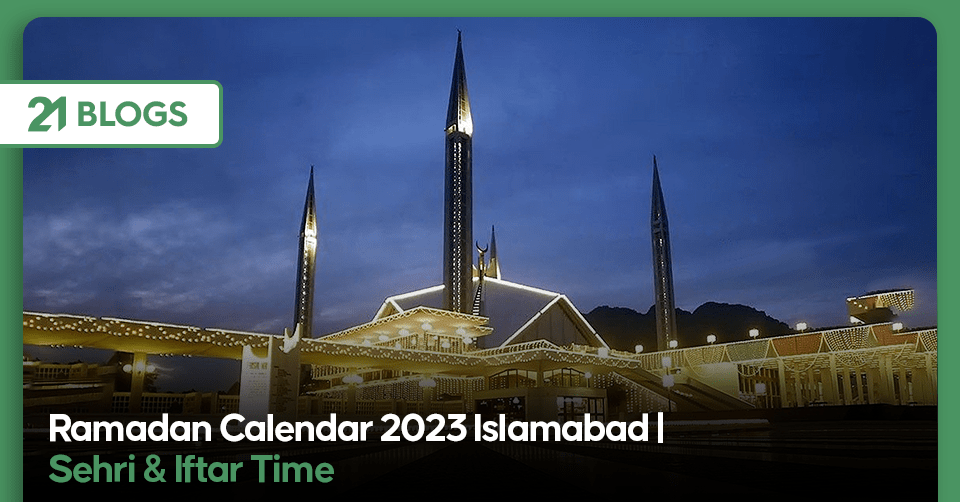Ramadan Calendar 2023 Islamabad | Sehri & Iftar Time

Ramadan is a month of great significance for Muslims all over the world, as it marks the period when the Holy Quran was revealed to Prophet Muhammad (peace be upon him) as guidance for mankind. The ninth month of the Islamic calendar, Ramadan is considered sacred and holds immense importance in the lives of Muslims, who observe it through fasting, prayer, and acts of charity.
In Pakistan, Muslims are fully equipped and prepared for the arrival of this blessed month, especially for the pre-dawn meal of Sehri and the evening meal of Iftar. However, the timing of these meals varies from city to city, depending on the time of sunrise and sunset in each area. This can make it difficult for people to keep track of the timings and observe their fasts accordingly.
Ramadan Calendar 2023 for Islamabad
To help make things easier, Agency21 International brings you the Ramadan calendar for Islamabad. This calendar provides the exact timings for Sehri and Iftar in Islamabad, ensuring that Muslims in the city can observe their fasts with ease and convenience.
So whether you are a resident of Islamabad or simply visiting during the month of Ramadan, you can use this calendar to keep track of the timings and ensure that you don’t miss out on the blessings of this sacred month. May Allah (SWT) accept our fasts and prayers and grant us all the strength and guidance to make the most of this blessed month.
Fiqh Hanafi Timing
|
No. |
Date | Sehri | Iftar |
| 1 | 23 Mar 2023 | 04:44 AM |
6:22 PM |
| 2 | 24 Mar 2023 | 04:43 AM |
6:23 PM |
| 3 | 25 Mar 2023 | 04:41 AM |
6:24 PM |
| 4 | 26 Mar 2023 | 04:40 AM |
6:24 PM |
| 5 | 27 Mar 2023 | 04:38 AM |
6:25 PM |
| 6 | 28 Mar 2023 | 04:37 AM |
6:26 PM |
|
7 |
29 Mar 2023 | 04:35 AM | 6:27 PM |
| 8 | 30 Mar 2023 | 04:34 AM |
6:27 PM |
| 9 | 31 Mar 2023 | 04:32 AM |
6:28 PM |
| 10 | 01 Apr 2023 | 04:31 AM |
6:29 PM |
|
11 |
02 Apr 2023 | 04:29 AM |
6:30 PM |
|
12 |
03 Apr 2023 | 04:28 AM |
6:30 PM |
|
13 |
04 Apr 2023 | 04:26 AM |
6:31 PM |
|
14 |
05 Apr 2023 | 04:25 AM |
6:32 PM |
|
15 |
06 Apr 2023 | 04:23 AM |
6:33 PM |
| 16 | 07 Apr 2023 | 04:22 AM |
6:33 PM |
|
17 |
08 Apr 2023 | 04:20 AM |
6:34 PM |
|
18 |
09 Apr 2023 | 04:19 AM |
6:35 PM |
| 19 | 10 Apr 2023 | 04:17 AM |
6:36 PM |
| 20 | 11 Apr 2023 | 04:16 AM |
6:36 PM |
| 21 | 12 Apr 2023 | 04:14 AM |
6:37 PM |
|
22 |
13 Apr 2023 | 04:13 AM |
6:38 PM |
|
23 |
14 Apr 2023 | 04:11 AM |
6:39 PM |
|
24 |
15 Apr 2023 | 04:10 AM |
6:39 PM |
|
25 |
16 Apr 2023 | 04:08 AM |
6:40 PM |
|
26 |
17 Apr 2023 | 04:07 AM |
6:41 PM |
|
27 |
18 Apr 2023 | 04:05 AM |
6:42 PM |
| 28 | 19 Apr 2023 | 04:04 AM |
6:42 PM |
| 29 | 20 Apr 2023 |
04:02 AM |
6:43 PM |
| 30 | 21 Apr 2023 | 04:01 AM |
6:44 PM |
Fiqh Jafria Timing
| No. | Date | Sehri |
Iftar |
|
1 |
23 March 2023 | 04:34 AM | 06:32 PM |
| 2 | 24 March 2023 | 04:33 AM |
06:33 PM |
| 3 | 25 March 2023 | 04:31 AM |
06:34 PM |
|
4 |
26 March 2023 | 04:30 AM |
06:34 PM |
| 5 | 27 March 2023 | 04:28 AM |
06:35 PM |
| 6 | 28 March 2023 | 04:27 AM |
06:36 PM |
| 7 | 29 March 2023 | 04:25 AM |
06:37 PM |
|
8 |
30 March 2023 | 04:24 AM |
06:37 PM |
| 9 | 31 March 2023 | 04:22 AM |
06:38 PM |
|
10 |
01 April 2023 | 04:21 AM |
06:39 PM |
| 11 | 02 April 2023 | 04:19 AM |
06:40 PM |
|
12 |
03 April 2023 | 04:18 AM |
06:40 PM |
|
13 |
04 April 2023 | 04:16 AM |
06:41 PM |
|
14 |
05 April 2023 | 04:15 AM |
06:42 PM |
|
15 |
06 April 2023 | 04:13 AM |
06:43 PM |
|
16 |
07 April 2023 | 04:12 AM |
06:43 PM |
| 17 | 08 April 2023 | 04:10 AM |
06:44 PM |
|
18 |
09 April 2023 | 04:09 AM | 06:45 PM |
| 19 | 10 April 2023 | 04:07 AM |
06:46 PM |
|
20 |
11 April 2023 | 04:06 AM |
06:46 PM |
|
21 |
12 April 2023 | 04:04 AM |
06:47 PM |
|
22 |
13 April 2023 | 04:03 AM |
06:48 PM |
|
23 |
14 April 2023 | 04:01 AM |
06:49 PM |
|
24 |
15 April 2023 | 04:00 AM |
06:49 PM |
|
25 |
16 April 2023 | 03:58 AM |
06:50 PM |
|
26 |
17 April 2023 | 03:57 AM |
06:51 PM |
|
27 |
18 April 2023 | 03:55 AM |
06:52 PM |
| 28 | 19 April 2023 | 03:54 AM |
06:52 PM |
|
29 |
20 April 2023 | 03:52 AM |
06:53 PM |
| 30 | 21 April 2023 | 03:51 AM |
06:54 PM |
Importance of Sehri and Iftar in Islam
Sehri and Iftar are two essential meals that hold immense significance for Muslims during the holy month of Ramadan. The month of Ramadan is a time for spiritual reflection, self-improvement, and an opportunity for Muslims to strengthen their faith through fasting.
Fasting during Ramadan is considered one of the Five Pillars of Islam and is obligatory for all adult Muslims who are physically and mentally capable.
Significance of Sehri
Sehri, also known as Suhoor, is the pre-dawn meal that Muslims have before beginning their fast. It is an essential meal because it provides the body with the necessary energy and nutrients to sustain through the long day of fasting ahead. The Sehri meal is recommended to be eaten close to the time of Fajr Azan, which is the first prayer of the day. This meal allows Muslims to sustain themselves throughout the day without feeling weak or fatigued. Therefore, it is important to eat nutritious food during Sehri, including complex carbohydrates, protein, and healthy fats. These foods help sustain energy levels and maintain blood sugar levels throughout the day.
Moreover, the act of having Sehri holds a lot of importance in Islam, as it is considered an act of worship. Muslims are encouraged to have Sehri because it is believed that Allah grants immense blessings and rewards for those who partake in it. The Prophet Muhammad (PBUH) once said, “Take Sehri as there is a blessing in it” (Bukhari). Therefore, Sehri is not only essential for physical health but also for spiritual well-being.
Significance of Iftar
On the other hand, Iftar is the meal Muslims break their fast with at sunset. It is considered a time of celebration, gratitude, and unity. The fast is broken with dates, as it is believed that the Prophet Muhammad (PBUH) broke his fast with dates. Dates are rich in natural sugars and nutrients, making them an excellent food to break the fast with.
Furthermore, Iftar is also considered an act of worship in Islam. It is believed that the act of breaking the fast is rewarded by Allah. The Prophet Muhammad (PBUH) once said, “The people will remain upon goodness as long as they hasten to break their fast” (Bukhari). Therefore, it is important to break the fast on time and with a grateful heart.
Spiritual Importance of Ramadan
In addition to the physical and spiritual benefits of fasting, Ramadan is also a time for Muslims to practice self-discipline, self-control, and empathy towards the poor. Through fasting, Muslims experience what it is like to go without food and water, which helps to build empathy and understanding for those who are less fortunate. Ramadan is also a time for Muslims to give charity and help those in need, which further strengthens the bonds of community and reinforces the importance of giving back.
In conclusion, Sehri and Iftar are two essential meals during the holy month of Ramadan. They hold immense significance for Muslims, not only for physical sustenance but also for spiritual nourishment. These meals are considered acts of worship and are rewarded by Allah. Ramadan is a time for Muslims to strengthen their faith, practice self-discipline, and show empathy towards the less fortunate. Through Sehri and Iftar, Muslims are reminded of the importance of gratitude, unity, and community.
For the latest Real Estate News and Blogs, visit Agency21 International.

